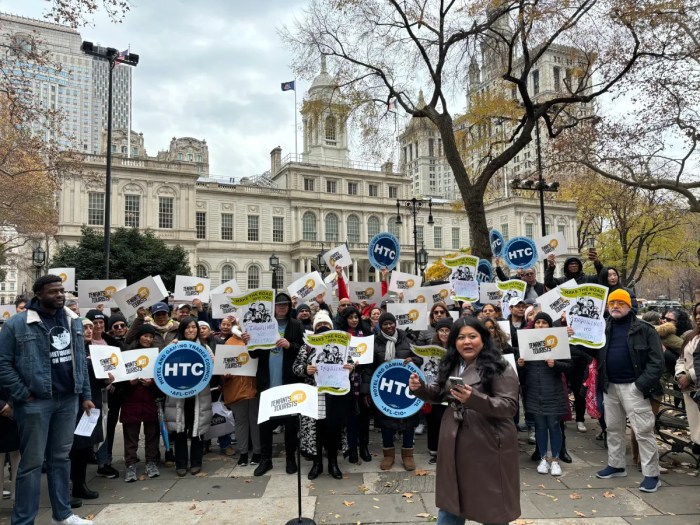By Sadef Ali Kully
NYPD Commissioner William Bratton spoke to the southeast Queens community in an effort to shelve the notion of police bias against minorities at a Black History month celebration at the Greater Allen AME Church in Jamaica Tuesday morning.
A prayer from Rev. Floyd Flake followed by an introductory speech by U.S. Rep. Gregory Meeks (D-Jamaica) set the tone for the message from the event: that communities and police should work together to overcome their struggles.
“Maybe that is what is in the struggle. We don’t see each other, we have to learn to see each other in each other,” Meeks said as he introduced Bratton.
“In so many ways that count, Black History Month is American History Month, because American history and the black experience are inextricable. And both are inextricable from policing,” Bratton said as he began his address to the black leaders and community members.
He pointed out that slavery, which he called “the country’s original sin,” was enforced by police. He also noted the death of James Powell, who was shot and killed by a police officer, caused the 1964 riots in Harlem. In the ‘ 70s and 80s crime rates soared, earning New York City the nickname “Fear City.”
In the ‘90s, the city took strong initiatives to bring crime down and it was met with success, with crimes at their lowest point since 1993.
“But despite this magnificent accomplishment, we’ve seen in the past years that police actions can still be a flash point. And everywhere, endless debate and discussion about a deepening racial divide in this city and this country. Here in New York, that divide is deepest and widest in neighborhoods where disparity is deepest and widest, where the distance between the people and the American dream is the farthest,” Bratton said.
The police shooting of Michael Brown in Ferguson, Mo., the death of Eric Garner by a police chokehold in Staten Island, and most recently the shooting death of Akai Gurley by a rookie NYPD officer in Brooklyn have created a rift between minority communities and police.
“In this city, they’re the neighborhoods where crime hangs on. And they are the neighborhoods where the police are most needed. In New York City, they are largely neighborhoods of color,” he said. “And in them, the relationship with the police has been ruptured.”
Bratton referred to FBI Director James Comey’s speech about the “hard truths” of policing in minority communities in a talk at Georgetown University in Washington earlier this month.
“The NYPD needs to face the hard truth in our most vulnerable neighborhoods, that we have a problem with citizen satisfaction,” said Bratton. “But there is another hard truth to face. It’s that, in our city, there are intractable racial disparities in who commits and who suffers from crime. Ninety-five percent of our shootings are committed by blacks and Hispanics. Ninety-five percent of our shooting victims are blacks and Hispanics. Ninety-five percent. In a city where just half of our citizens are black or Hispanic.”
Bratton also mentioned in the speech that new training programs have been in place since January. The 103rd Precinct in southeast Queens is one of the precincts that was chosen to undergo the trial mentor-training program by the NYPD.
“For my officers, this hard truth about who commits and suffers from violent crime in New York City carries a risk of turning into bias. It doesn’t matter if the officers are white or black, Hispanic or Asian—and, in fact, more than half of our police officers are minorities themselves,” said Bratton. “ If you see something again and again, it can infect your perspective. And they see the same young men in the same neighborhoods committing almost all of this city’s violence against the same victims—often the same young men. We need to fight against that.”
Bratton was met with loud applause and a standing ovation from the audience, which included former Gov. David Paterson, who was being awarded later at the celebration and other influential black community leaders from southeast Queens.
Reach Reporter Sadef Ali Kully by e-mail at skull




































